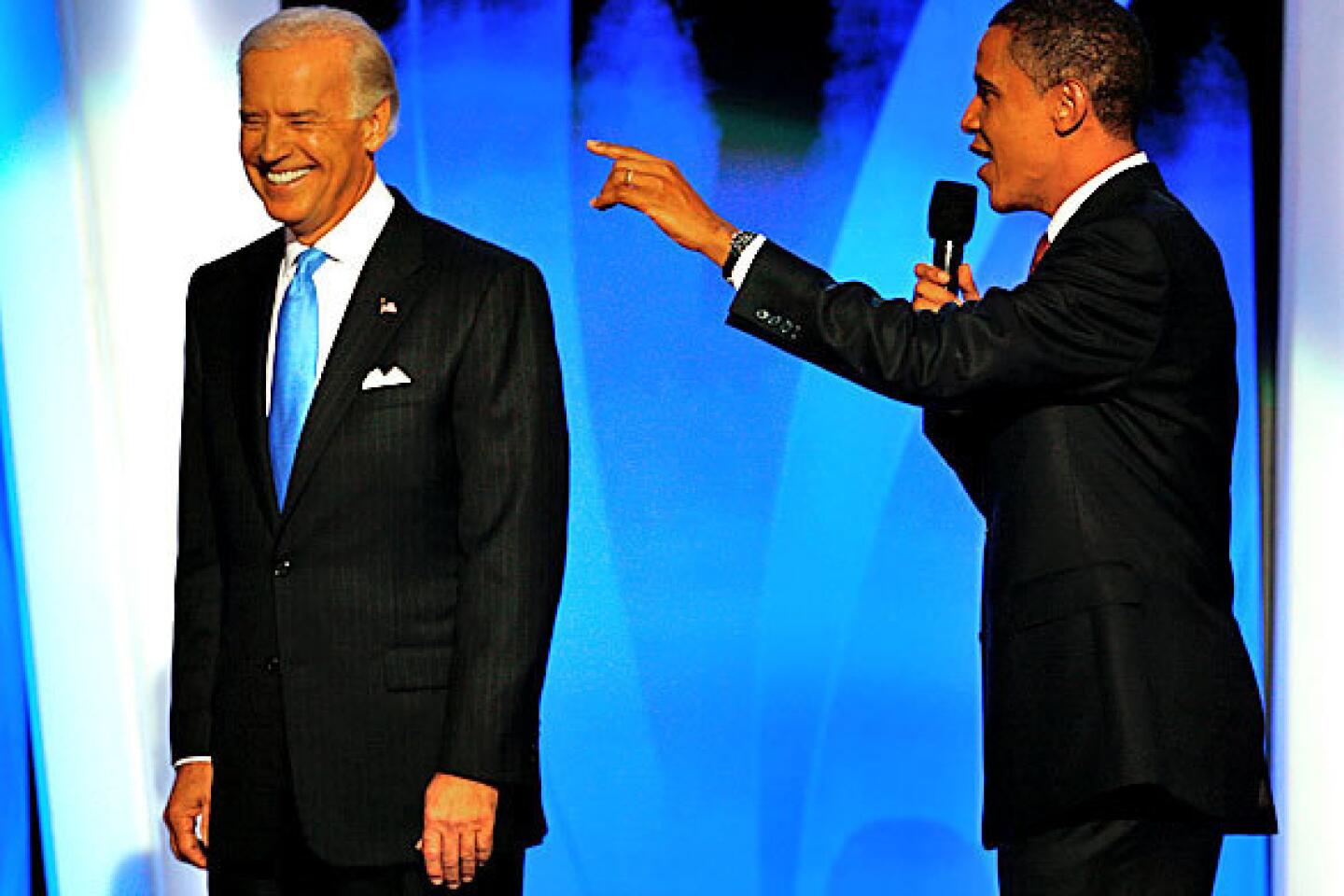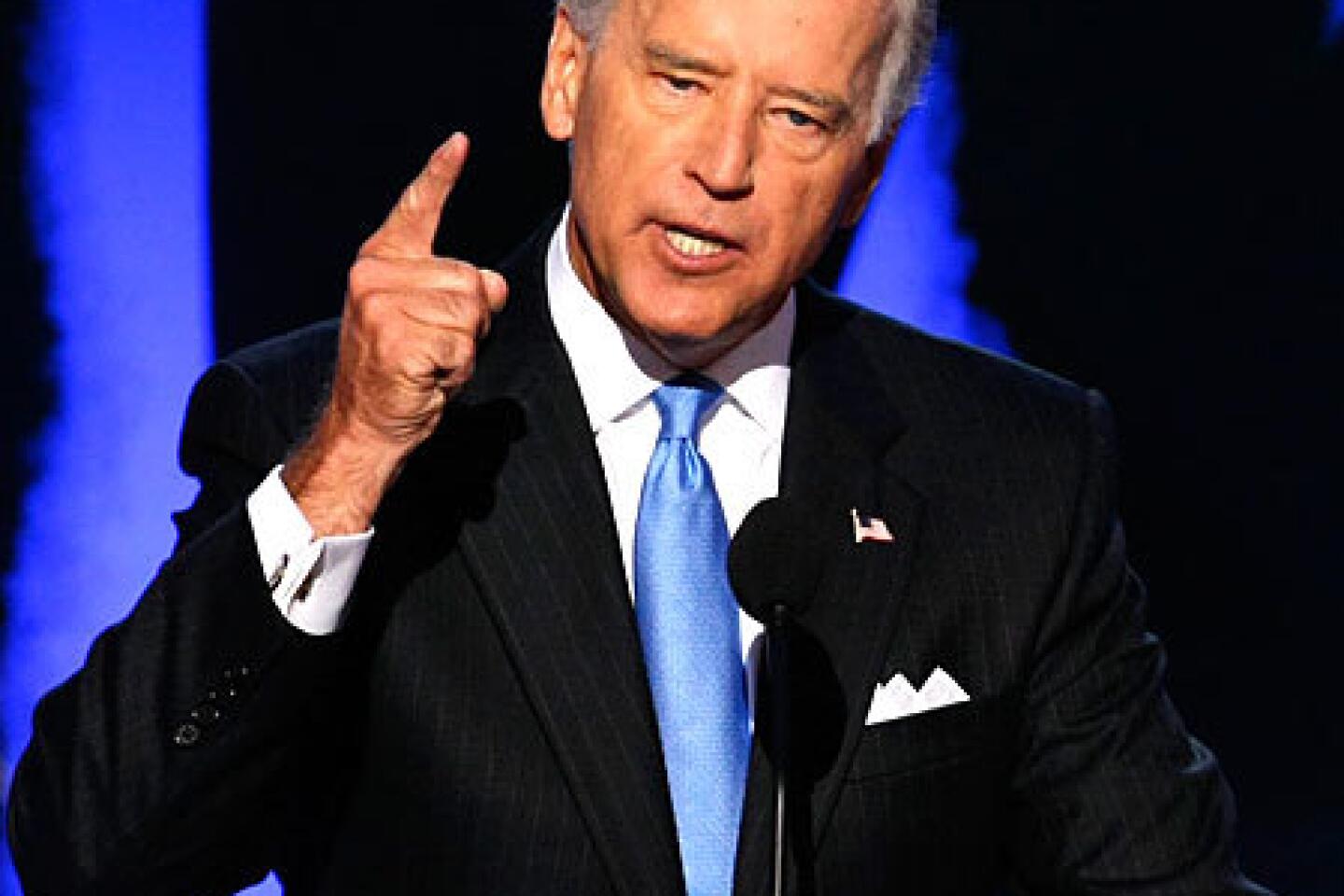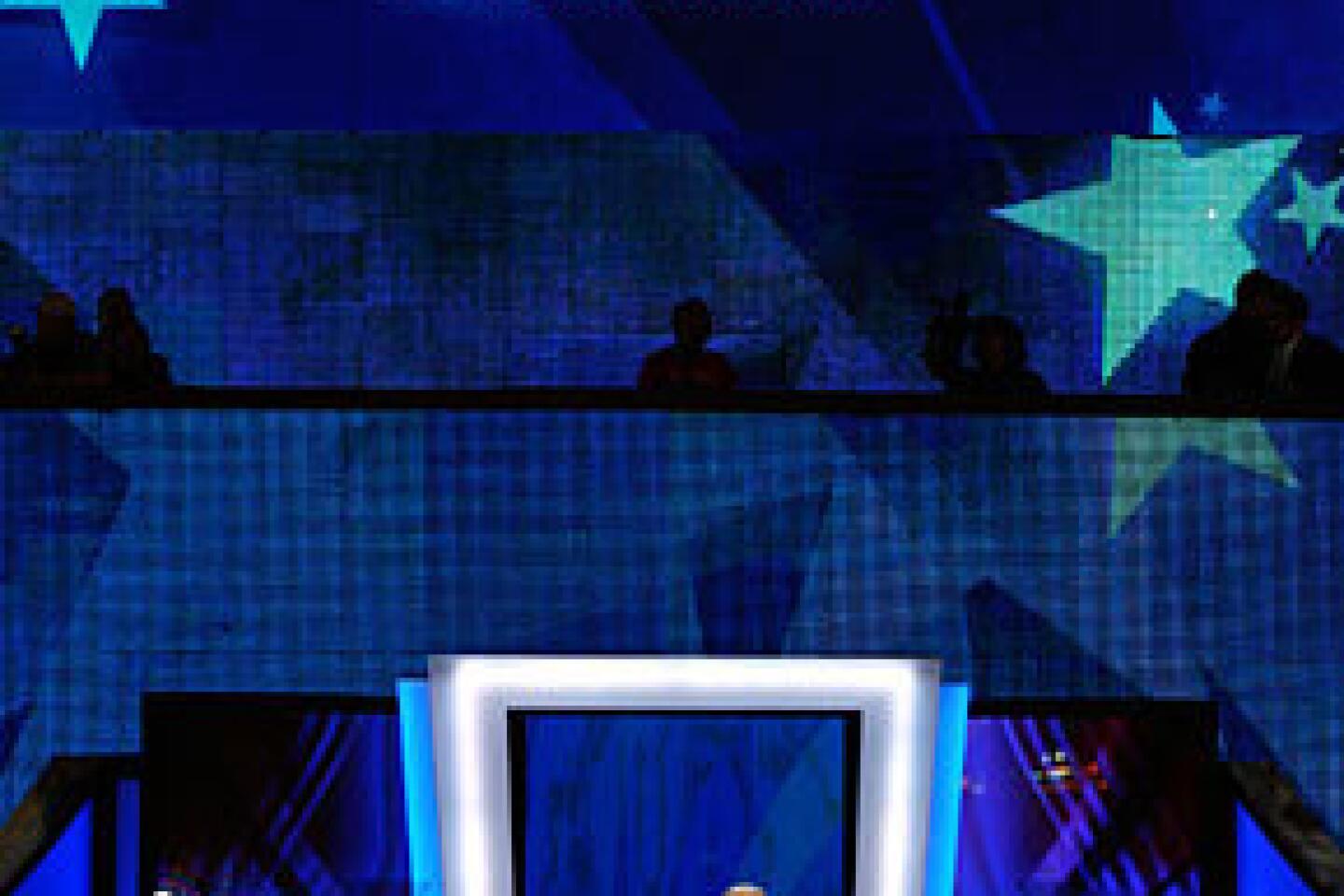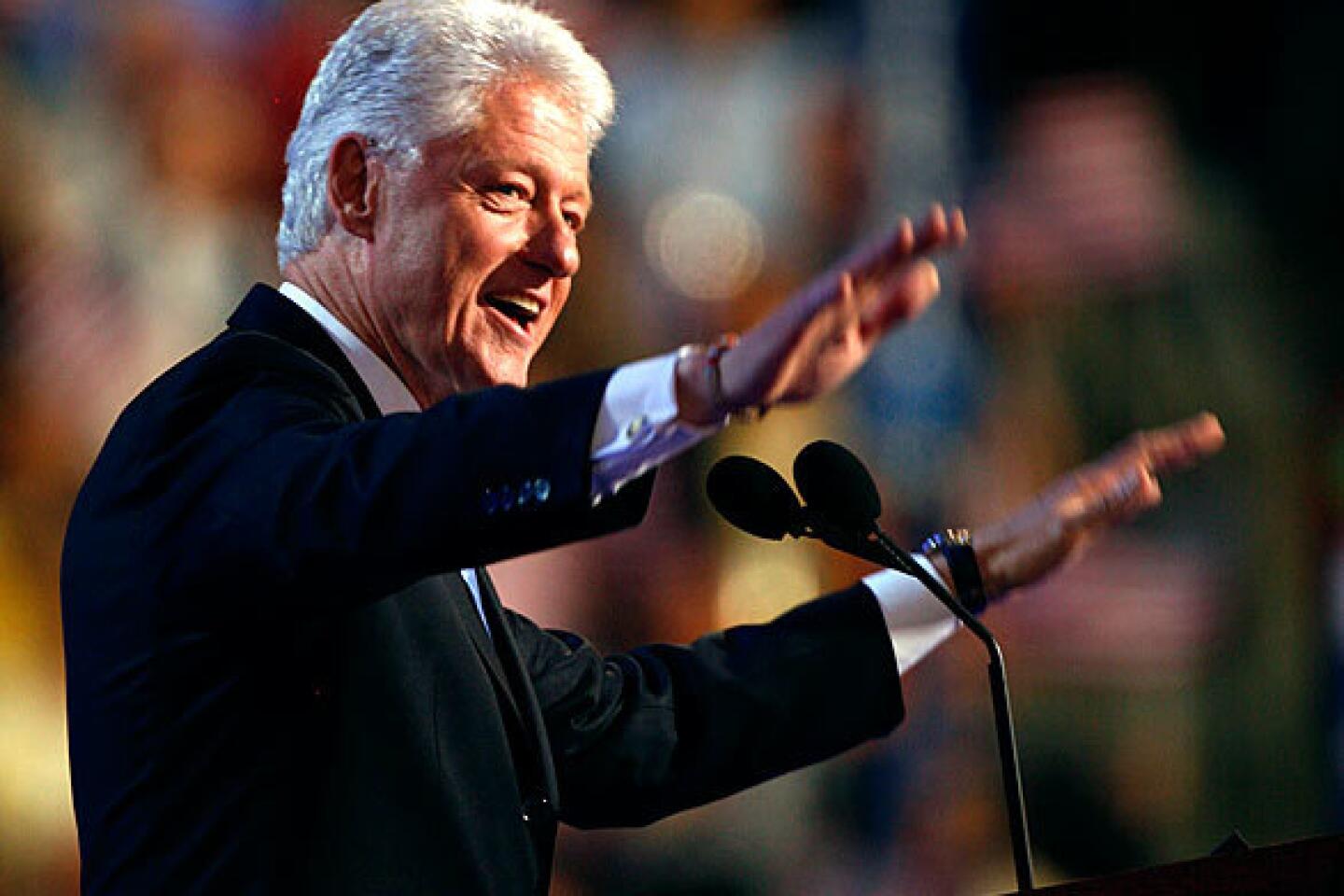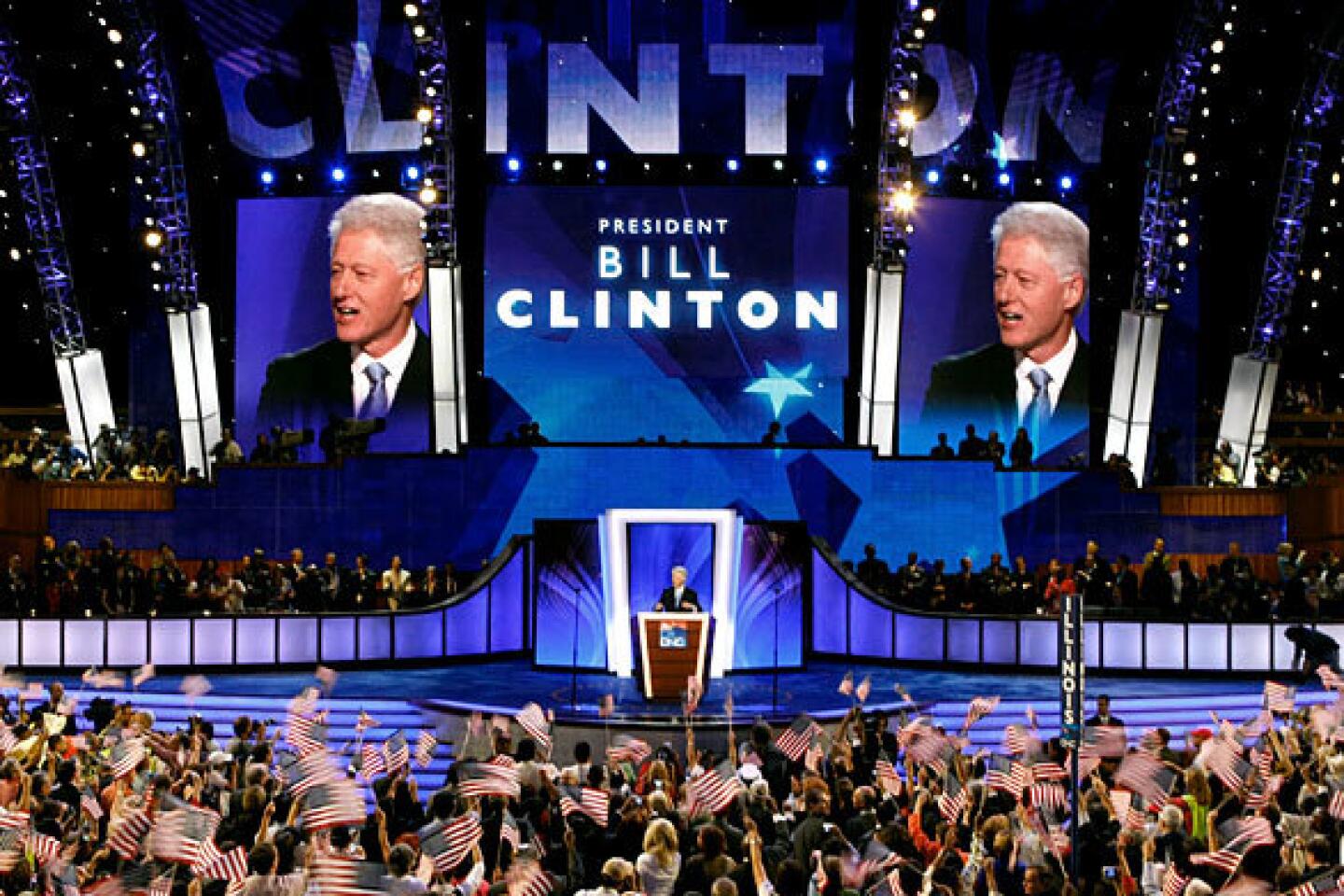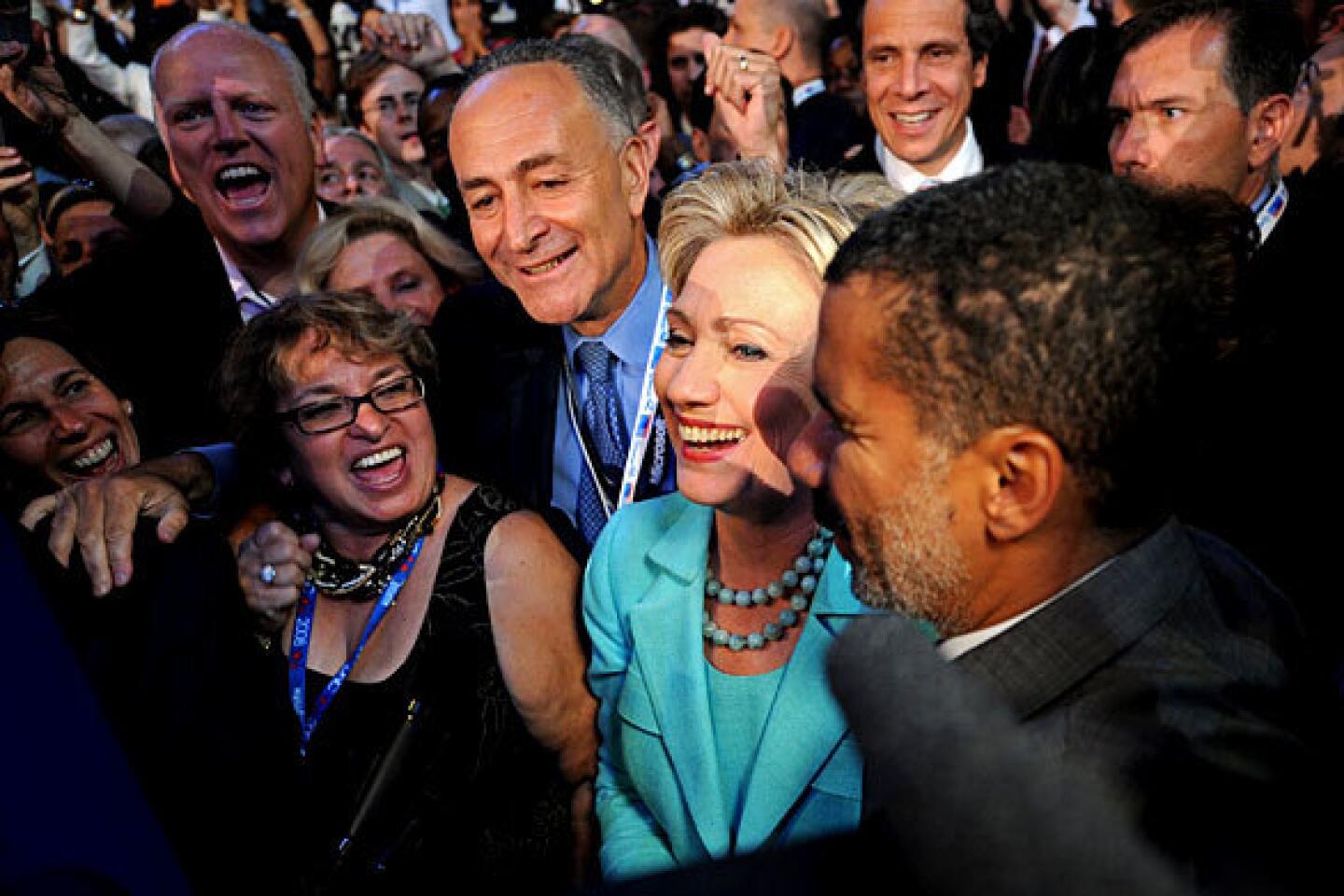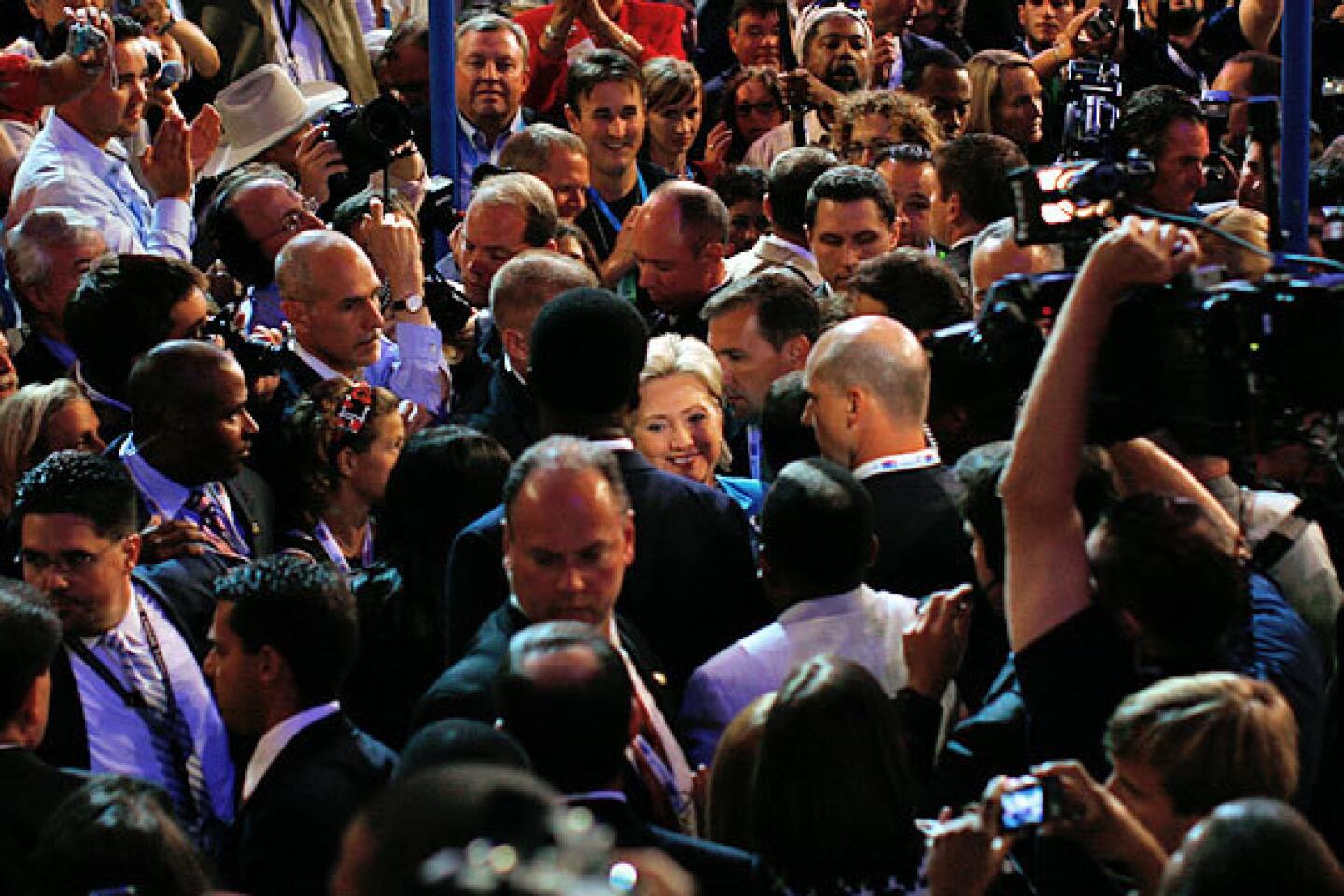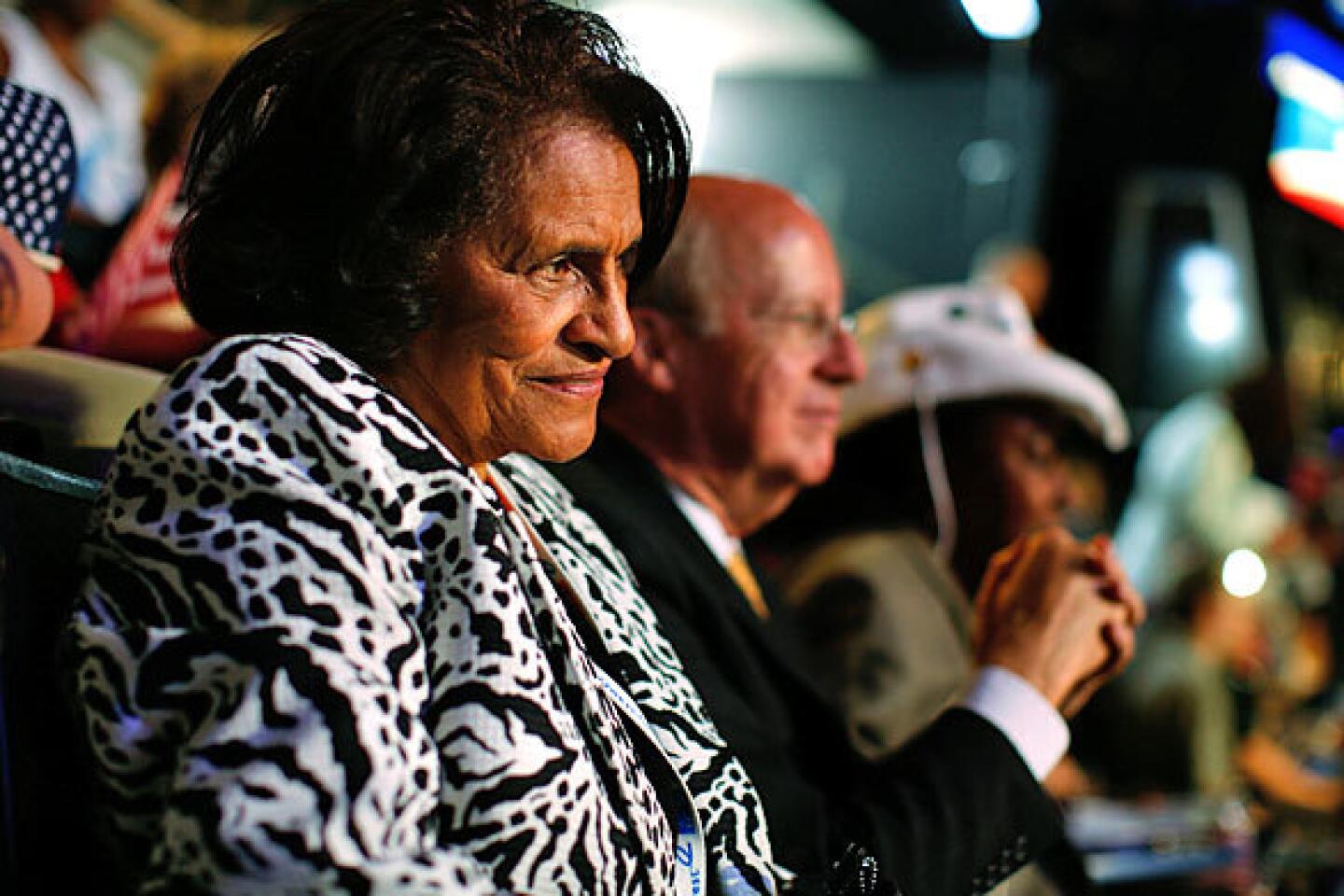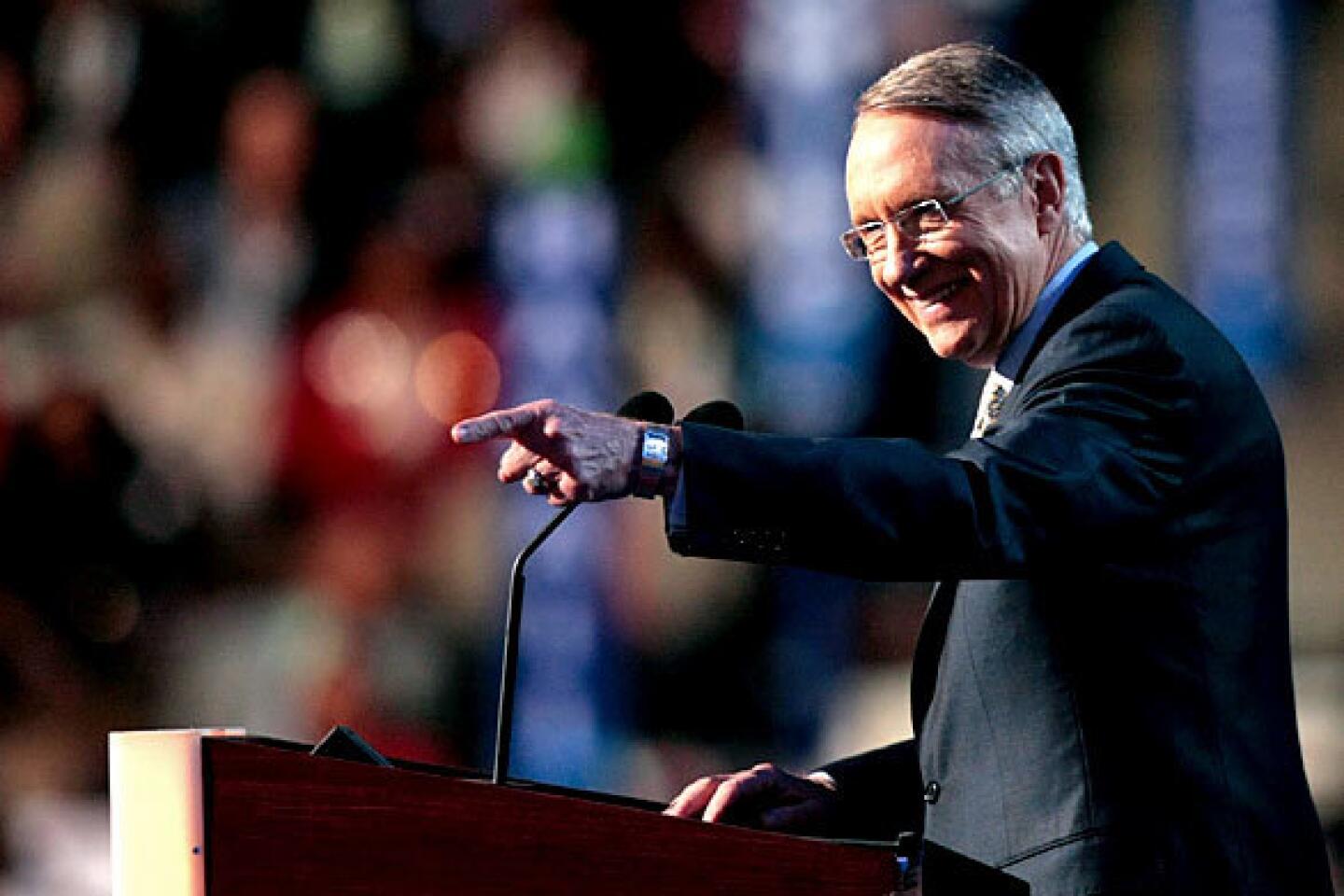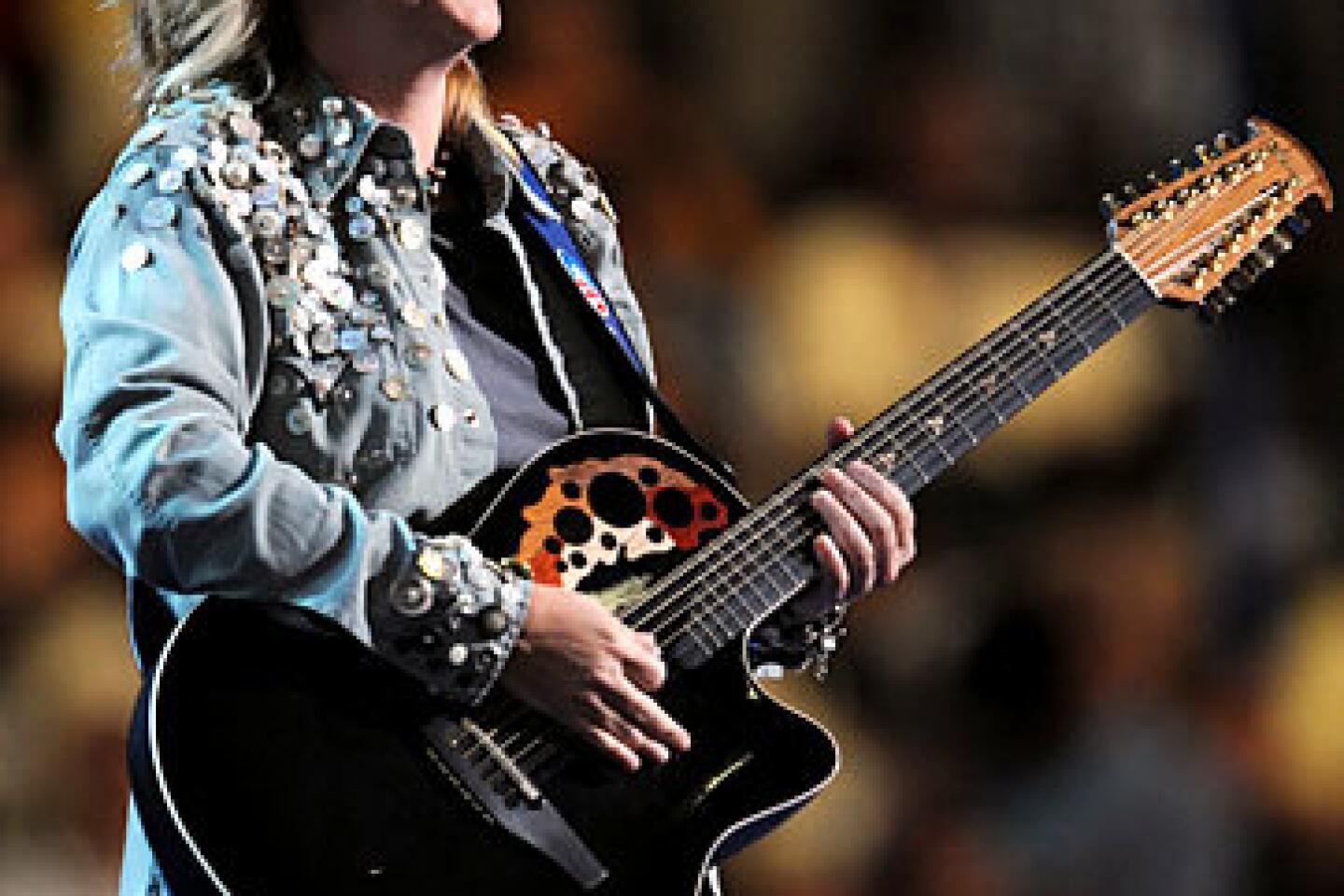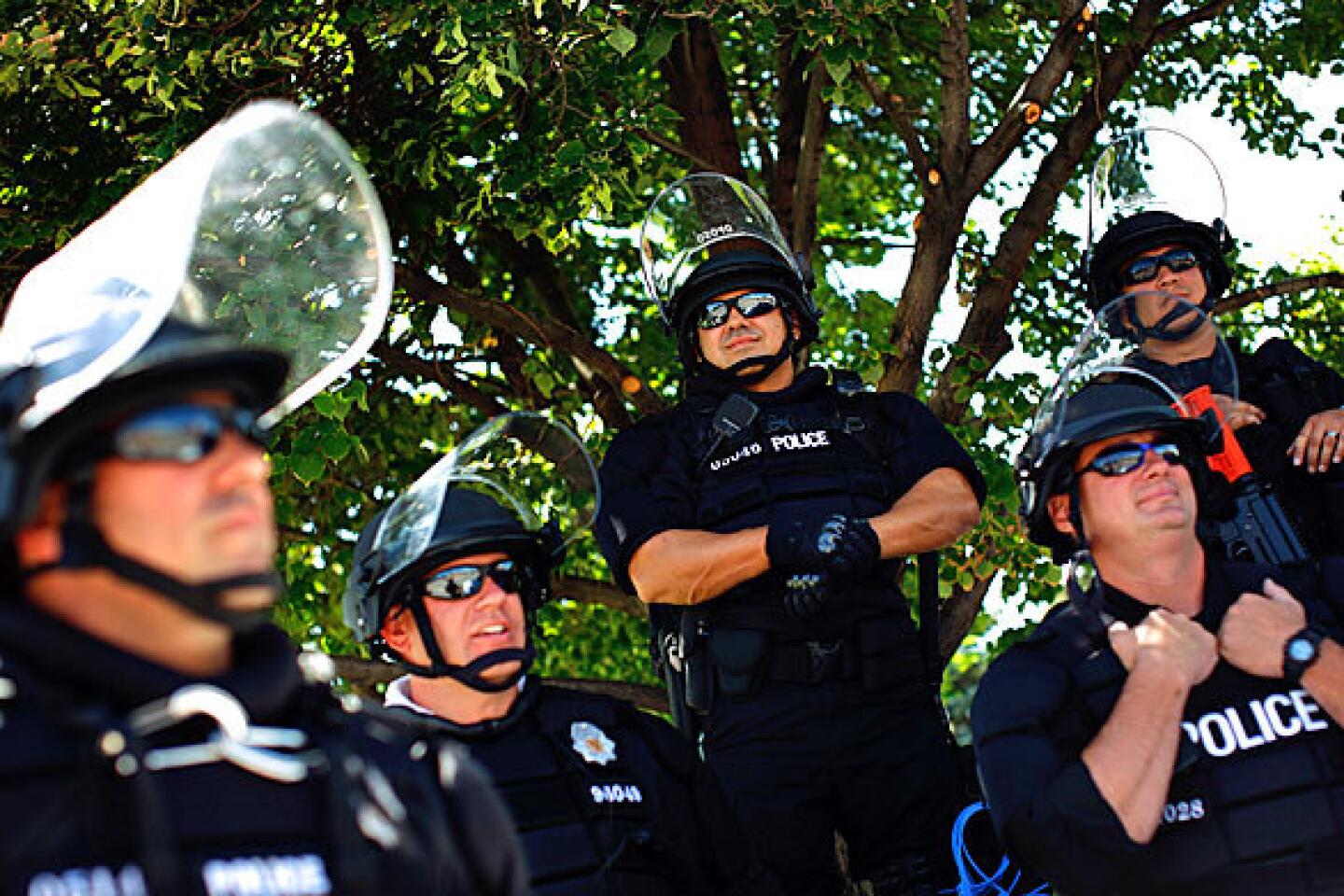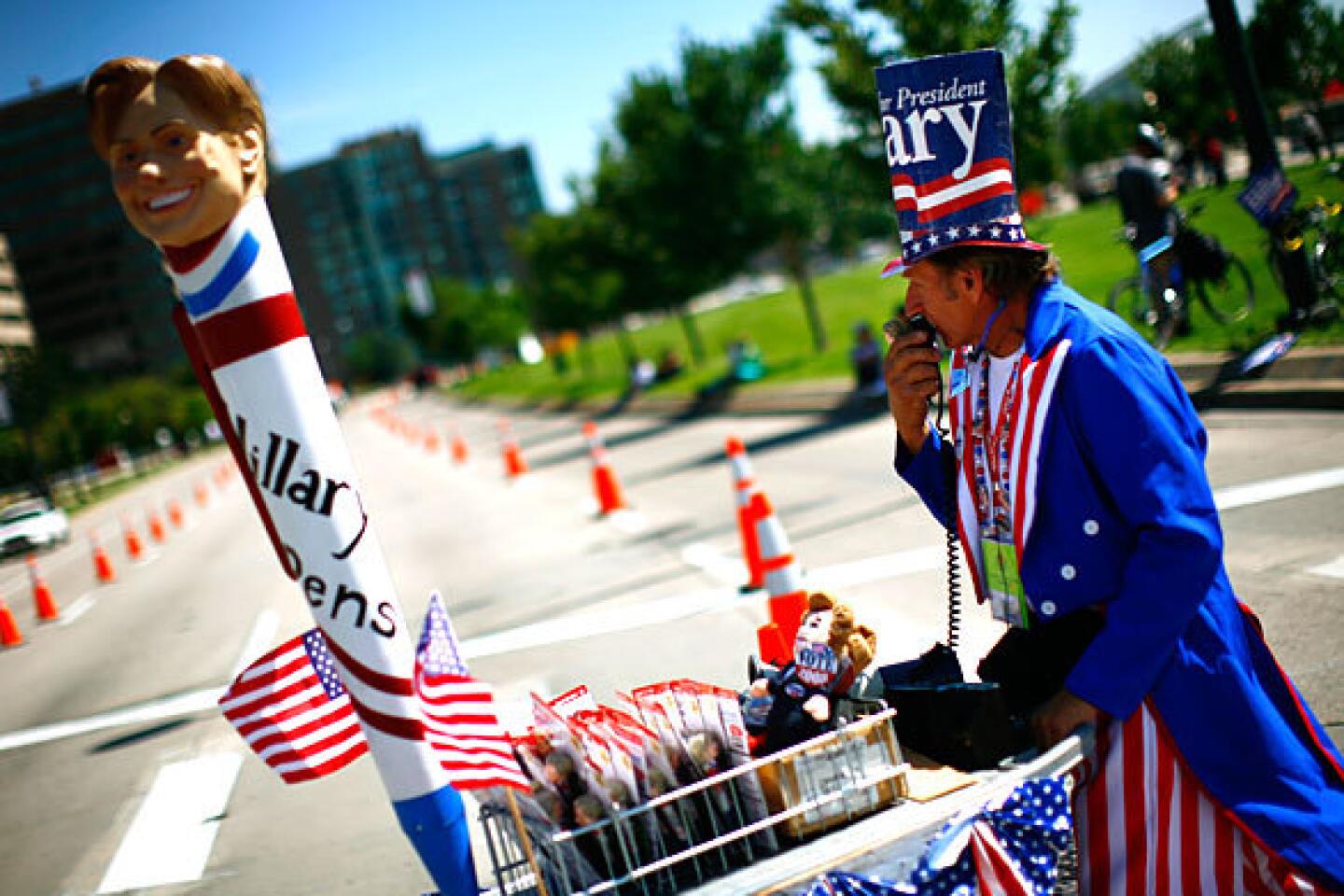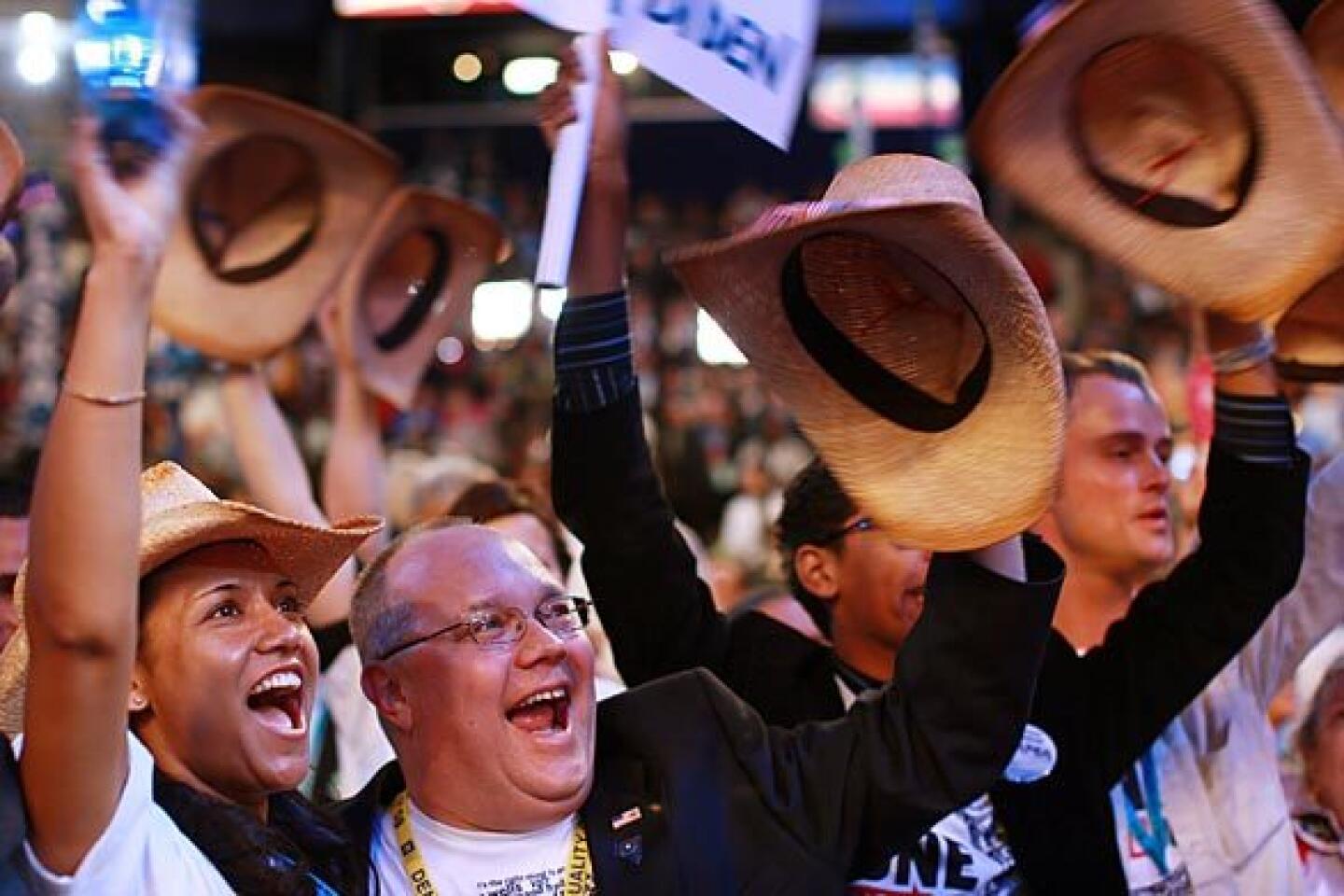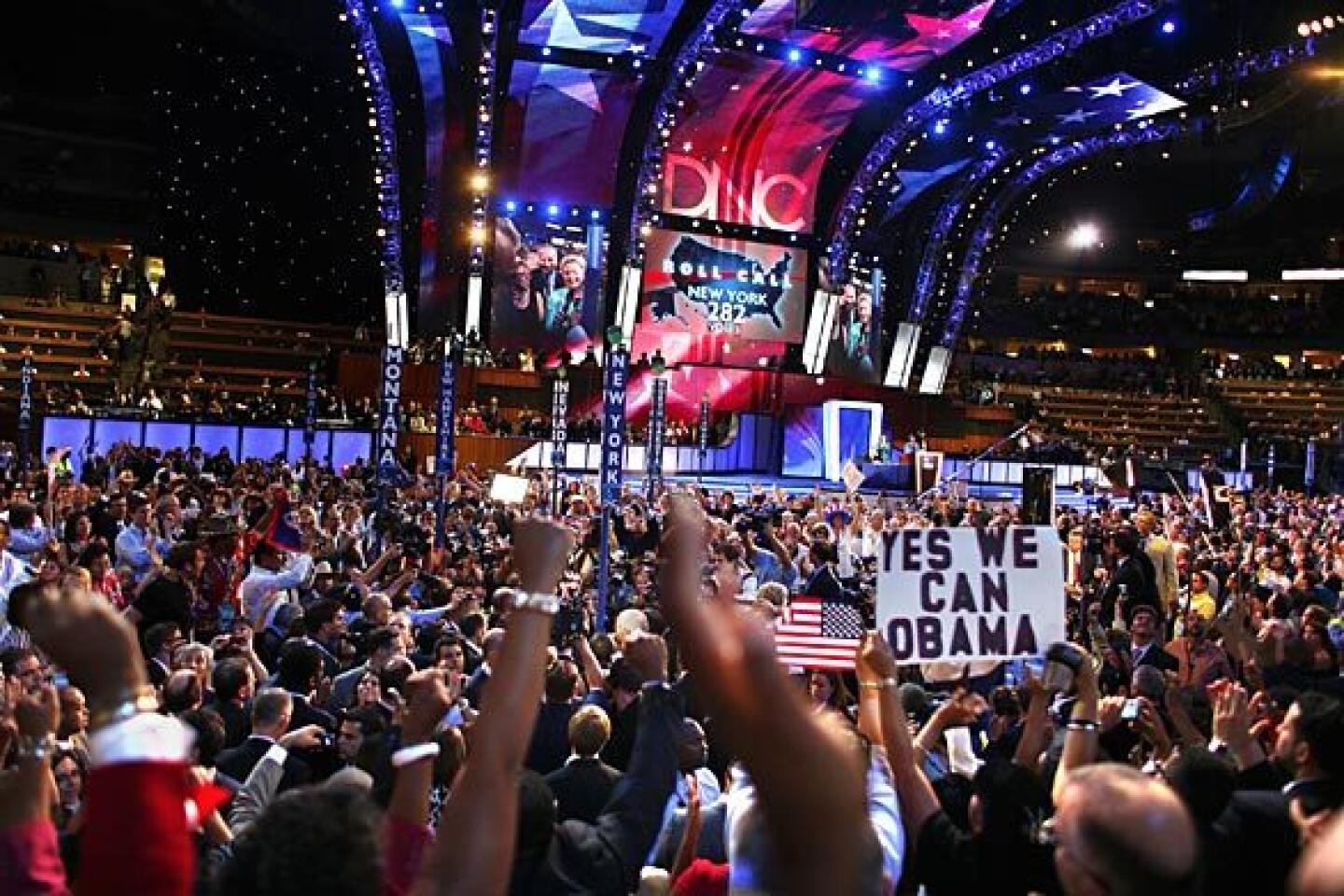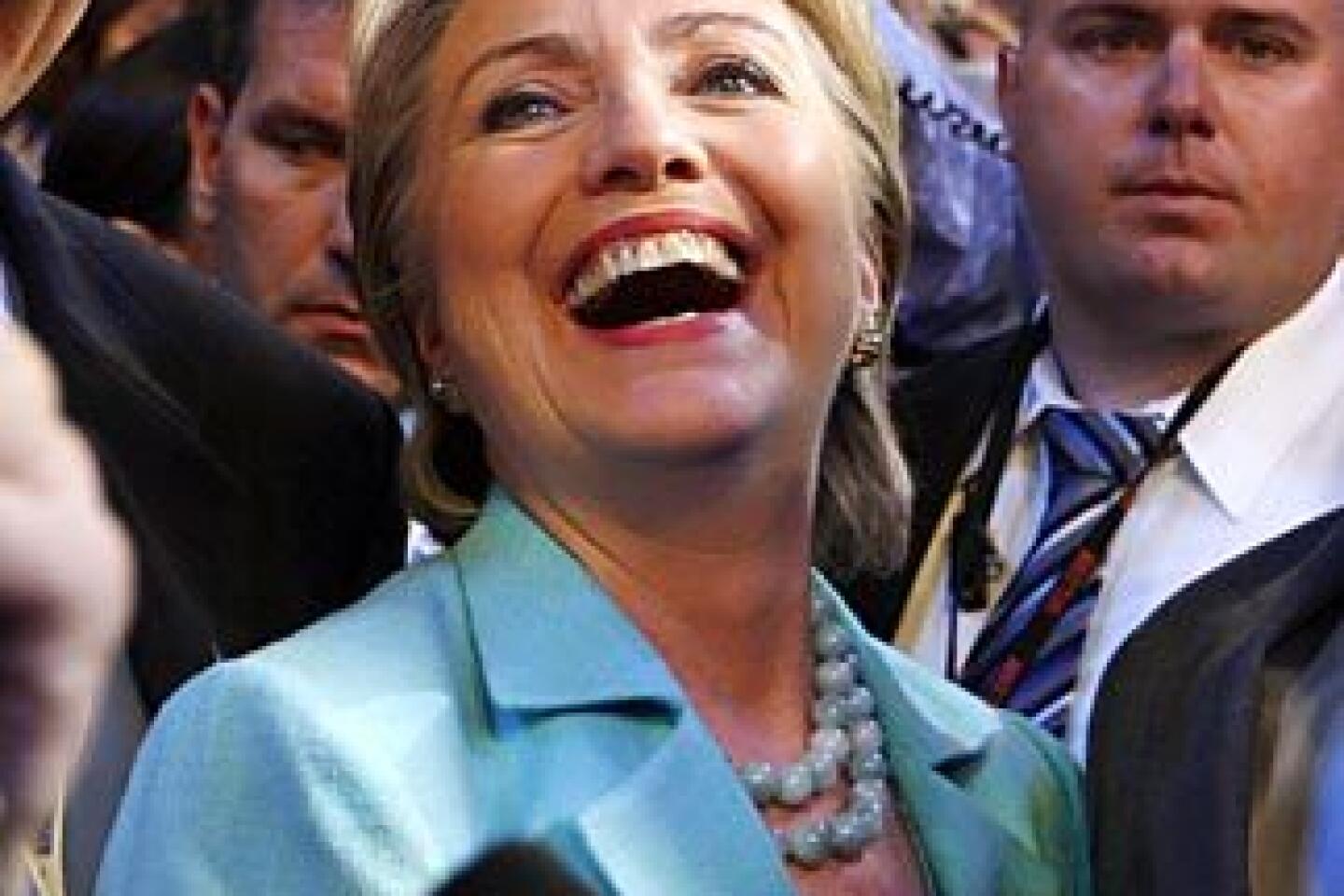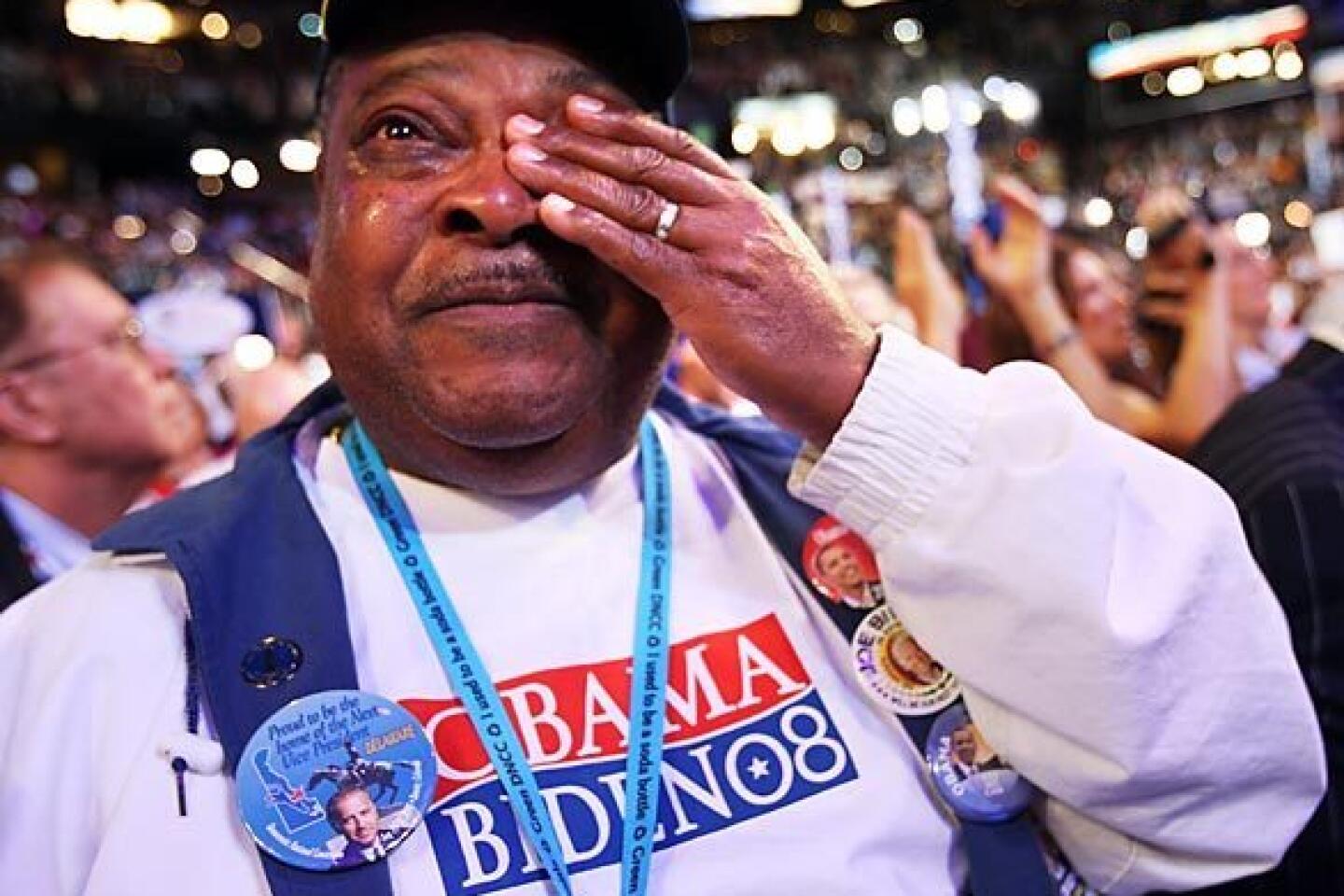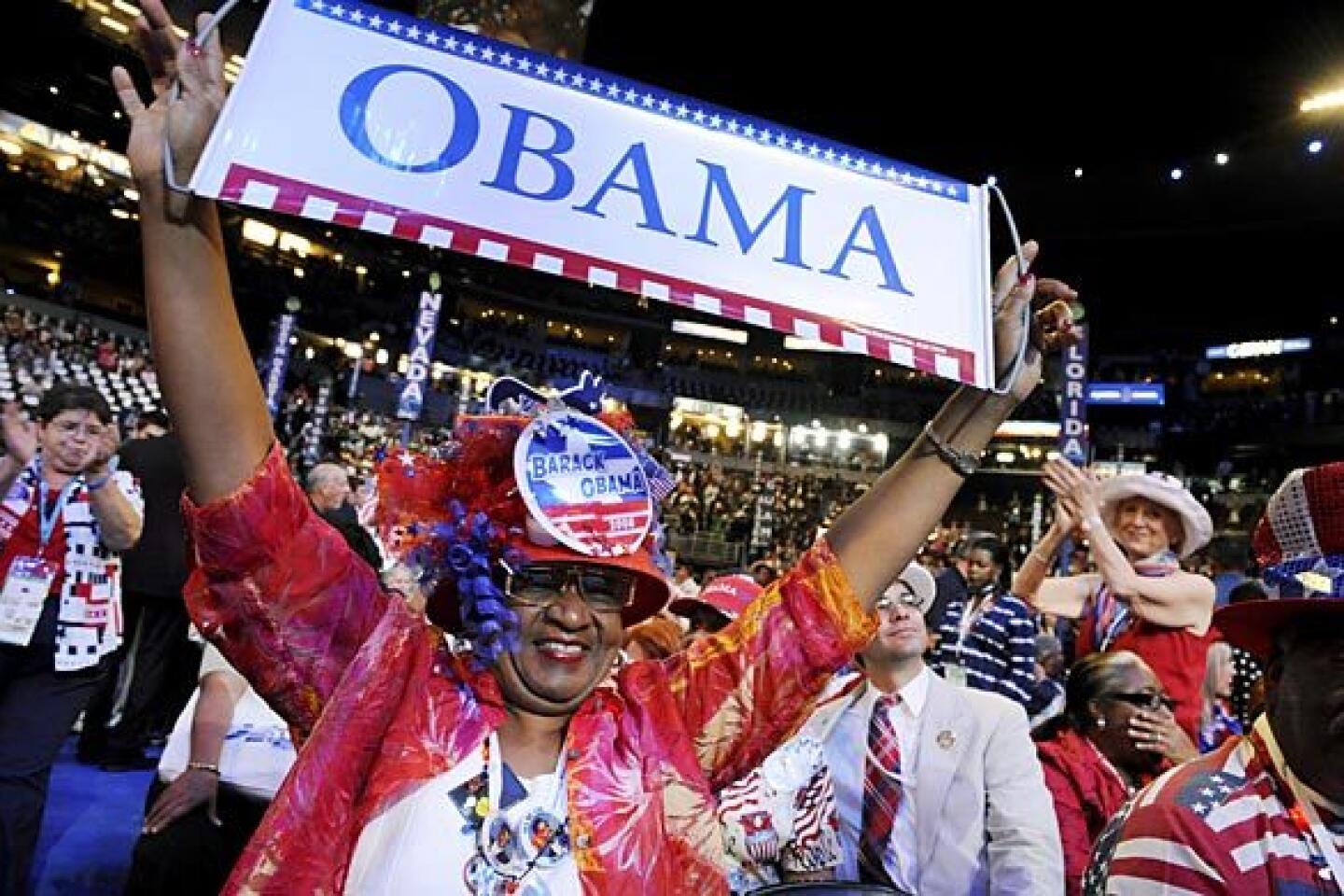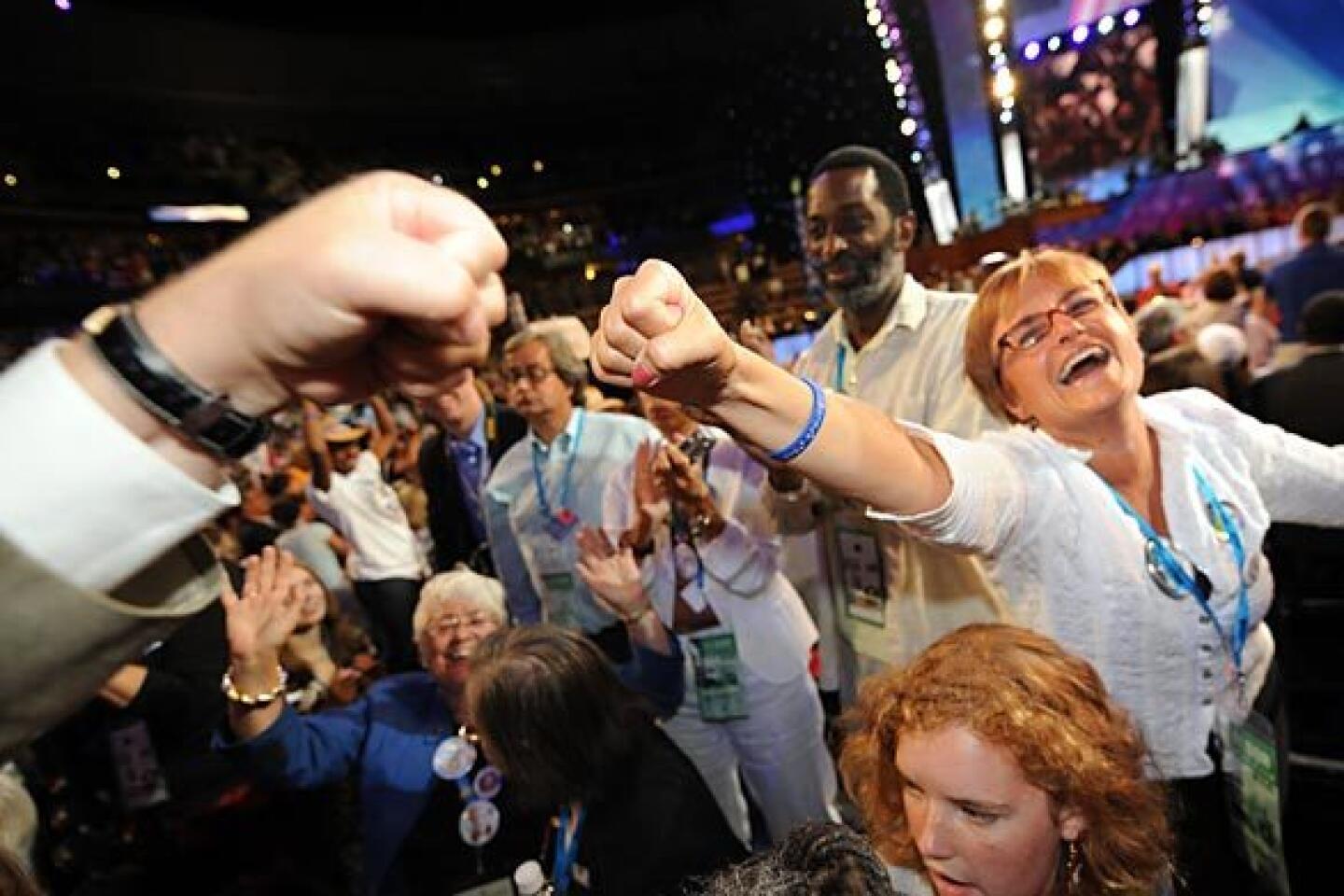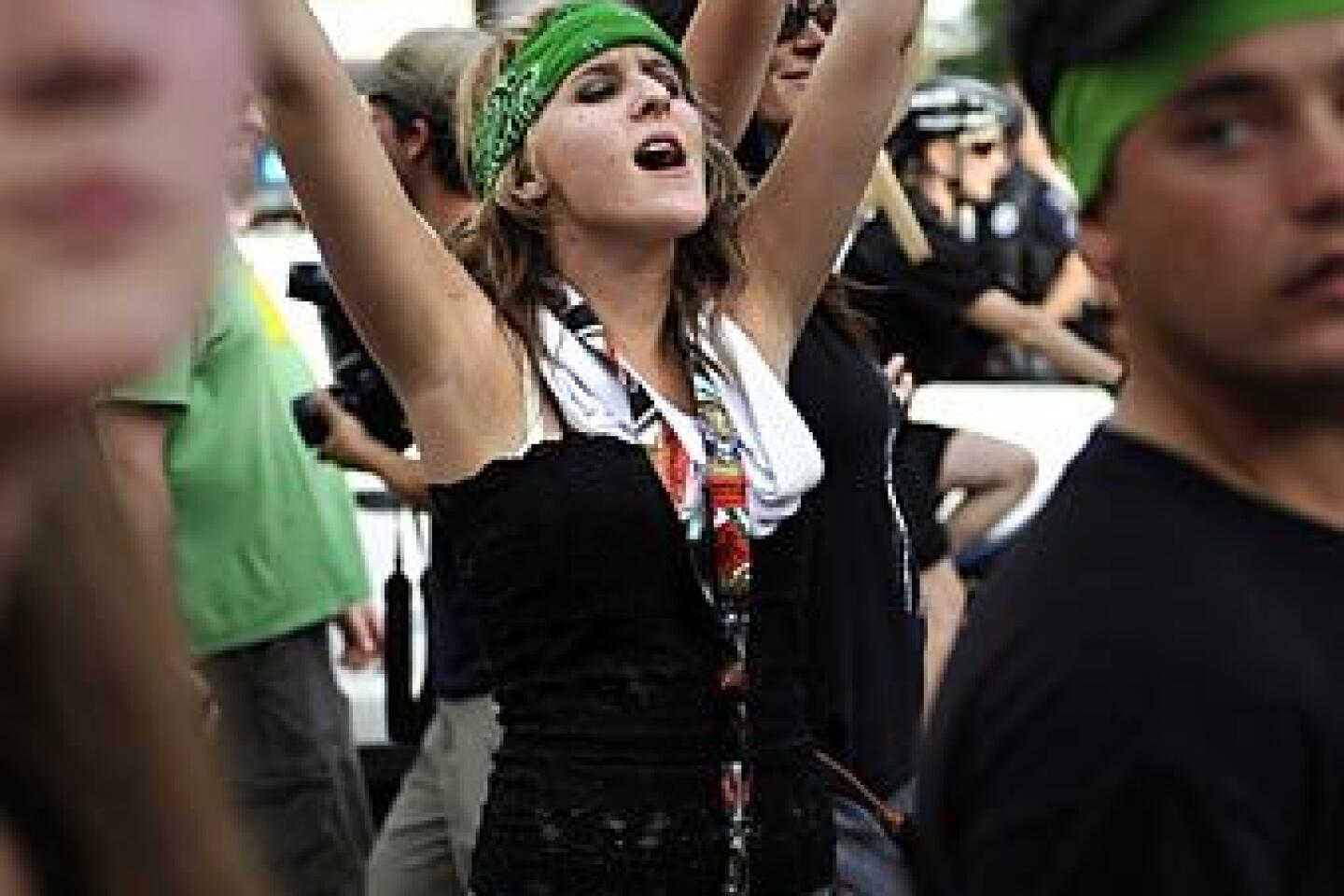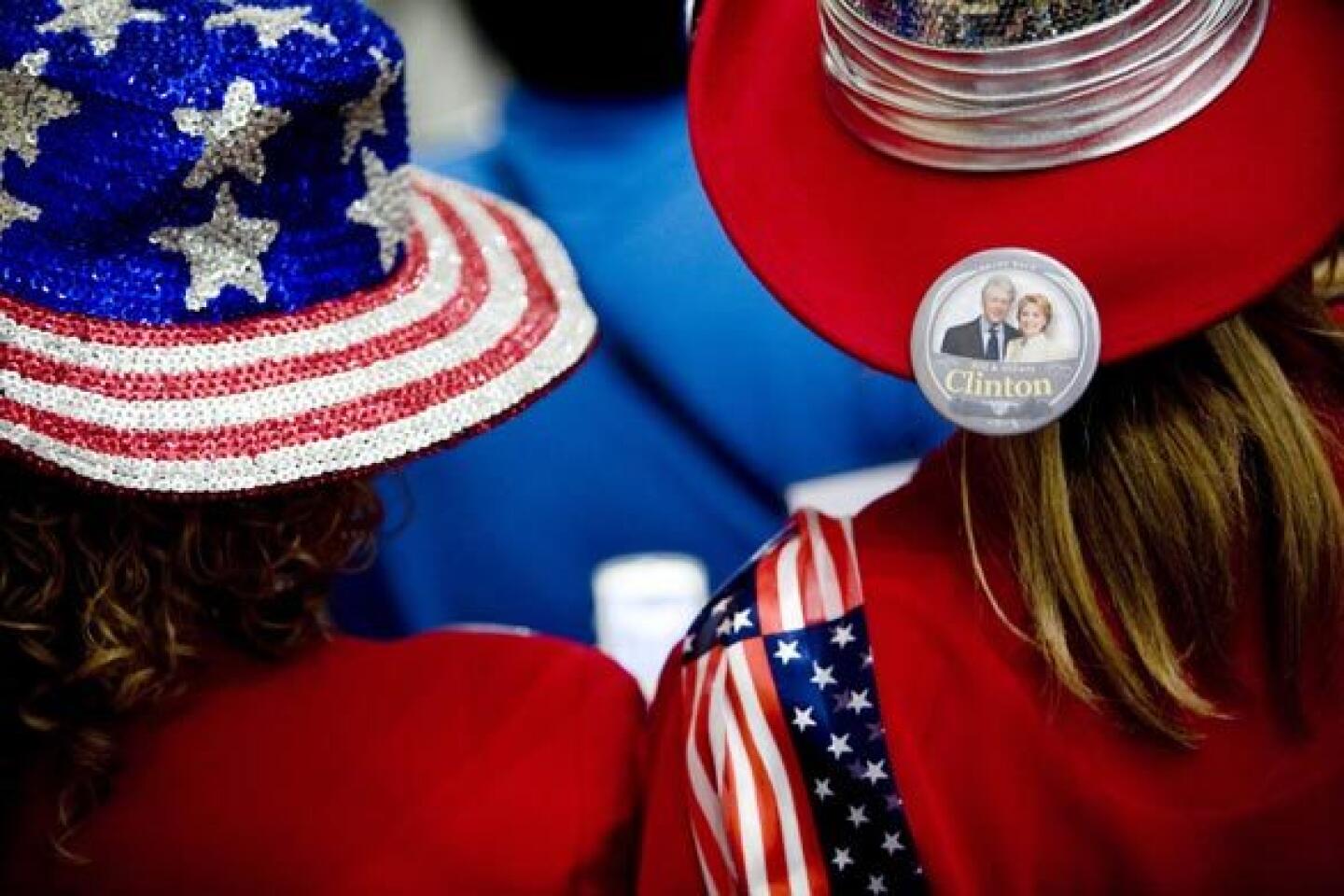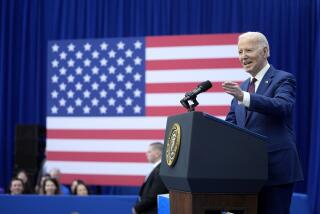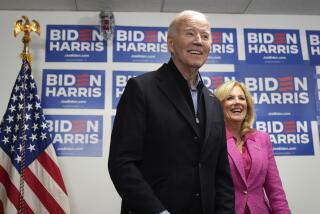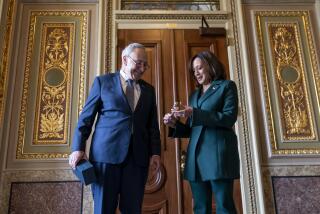Barack Obama’s nomination is unanimous and historic
Barack Obama, riding a message of change, swept aside a Democratic dynasty and two centuries of history Wednesday to become the first African American to lead a major political party into the fall campaign for the White House.
The vote was by acclamation after Sen. Hillary Rodham Clinton of New York waded onto the convention floor amid a standing ovation and stopped a roll call of delegations. She urged Obama’s unanimous selection as the party’s presidential nominee “in the spirit of unity, with the goal of victory.” Delegates shouted their affirmation, and the longest, most contentious Democratic primary fight in more than a generation came to a congenial halt.
Hours later, former President Clinton did his part for party peace by wrapping Obama in his unqualified embrace. “Everything I learned in my eight years as president and in the work I have done since, in America and across the globe, has convinced me that Barack Obama is the man for this job,” Clinton told cheering delegates, going far beyond the tepid endorsements he had offered in the past.
“Hillary told us in no uncertain terms that she’ll do everything she can to elect Barack Obama,” Clinton said, a day after his wife pledged her unstinting support. “That makes two of us.”
In a country with a difficult history of race relations, Obama overcame more than skin color to achieve his triumph. As the son of a white mother from Kansas and a black father from Kenya, his background is hardly that of a typical presidential candidate. His name, as he admits, is unusual. And his victory comes less than four years after he left the Illinois state Senate. A major goal this week is convincing voters that he has the experience, both personal and political, to understand their lives and step into the White House ready to lead.
Obama, 47, was at his Denver hotel with his wife, Michelle, and their two daughters when history was made. At evening’s end, he sent a jolt of electricity through the crowded arena when he strode onstage and embraced running mate Joe Biden, who made his convention debut with a speech that mixed autobiography with policy and pugnacity.
Saluting his erstwhile rival, Obama said, “If I’m not mistaken, Hillary Clinton rocked the house last night.” The crowd roared. “And just in case you’re wondering . . . President Clinton reminded us of what it is when you’ve got a president who actually puts people first.” The couple, along with their daughter, Chelsea, beamed from the VIP seats.
Obama’s installation as the Democratic nominee capped an improbably swift rise that began four years ago at the party’s national convention when Obama, then an Illinois state senator, delivered a soaring keynote address. Bookending his rise is Thursday night’s acceptance speech at Invesco Field, a football stadium expected to fill with more than 75,000 people.
On Wednesday, Democrats continued their pounding of Republican Sen. John McCain of Arizona, Obama’s fall rival and a more resilient opponent than many in the party had anticipated.
Sen. Jack Reed of Rhode Island called McCain the “cheerleader in chief” for the Iraq war. Senate Majority Leader Harry Reid of Nevada called McCain a snake oil salesman and, in an apparent dig at his nearly 72 years, referred to him as “kindly old Doc McCain.”
Sen. John F. Kerry of Massachusetts, the 2004 Democratic nominee who once considered McCain as a possible running mate, said “the candidate who once promised a ‘contest of ideas’ now has nothing left but personal attacks. How insulting. How pathetic. How desperate.”
Biden joined in. Citing Obama’s early opposition to the war in Iraq, he said, “Again and again, on the most important national security issues of our time, John McCain was wrong, and Barack Obama was proven right.”
“The choice in this election is clear,” said Biden, who twice tried for the White House himself. “These times require more than a good soldier; they require a wise leader, a leader who can deliver change.”
Obama’s formal nomination as the Democrat’s standard-bearer came in a choreographed minuet that followed weeks of negotiations between the Clinton and Obama camps.
The balloting stood at 1,549 for Obama and 341 for Clinton -- with 2,210 delegates needed to clinch the nomination -- when it came Illinois’ turn in the roll call of states. Chicago Mayor Richard M. Daley passed on behalf of the state delegation and the count skipped to New York. Clinton, surrounded by the governor and other state political leaders, read carefully from printed remarks, urging delegates to “declare together in one voice, right now, that Barack Obama is our candidate and he will be our president.”
She then moved to suspend the roll call and nominate Obama by acclamation. The crowd took up a chant of “Hillary,” which gave way to “Obama” and “Yes, we can” as the delegates approved the motion with a roaring “Aye!” The presiding officer, House Speaker Nancy Pelosi of San Francisco, quickly slammed her gavel before any dissent could be heard, and the song “Love Train” blasted through the speakers.
With the tension released, the scene inside the Pepsi Center was like an end-of-semester party. Delegates whooped, embraced and danced in the aisles.
Clinton is “a classy woman,” said Jonathan Starr, a 57-year-old planning commissioner from Maui. He and the rest of his lei-wearing delegation consider Obama, who was born on Oahu, a native son. “Our guy is going to be the next president,” he said. “And it all started in Hawaii.”
The happy tableau was completed when the former president took the stage, greeted by a prolonged ovation and a sea of waving American flags. “Sit down!” he finally exclaimed.
Clinton was his wife’s chief advocate during the primary season, for both good and ill. His eight-year record and continued popularity among Democrats offered her a strong political base to build upon. But his sometimes intemperate remarks also caused her problems, not least among African American voters, who were crucial to Obama’s success.
The former president challenged Obama’s qualifications more bluntly than his wife did and, critics said, worked in subtle ways to use Obama’s race against him. After Obama clinched the nomination in June, the former president was, at best, standoffish in his support. As recently as Monday, there was friction between the Obama and Clinton camps over whether he would stick to an Obama-approved script.
But all of that seemed forgotten when Clinton strode onto the high-tech stage inside the filled-to-capacity Pepsi Center.
After a proud nod to this wife and her trailblazing candidacy -- “she never quit on the people she stood up for, on the changes she pushed for, on the future she wants for all our children” -- Clinton endorsed Obama in a series of simple, declarative statements that left no room for doubt.
“Barack Obama is ready to lead America,” Clinton said as Obama’s wife, Michelle, stood and applauded from the balcony section. “Barack Obama is ready to be president of the United States.”
Clinton reached back to his first campaign for president in 1992, when he was 46 and, like Obama, new to the national political scene. “Republicans said I was too young and too inexperienced to be commander in chief,” Clinton said. “Sound familiar? It didn’t work in 1992 because we were on the right side of history. And it won’t work in 2008 because Barack Obama is on the right side of history.”
Clinton even summoned a metaphor from that campaign, urging his audience in the hall and beyond, “If, like me, you still believe America must always be a place called Hope, then join Hillary, Chelsea and me in making Sen. Barack Obama the next president of the United States.”
When delegates began to chant Obama’s slogan -- “Yes, we can” -- the ex-president joined in.
“Yes, we can,” Clinton said. “But first we have to elect him.”
Times staff writers Michael Finnegan, Peter Nicholas and Aaron Zitner and Chicago Tribune staff writer Jim Tankersley contributed to this report.
More to Read
Start your day right
Sign up for Essential California for news, features and recommendations from the L.A. Times and beyond in your inbox six days a week.
You may occasionally receive promotional content from the Los Angeles Times.

